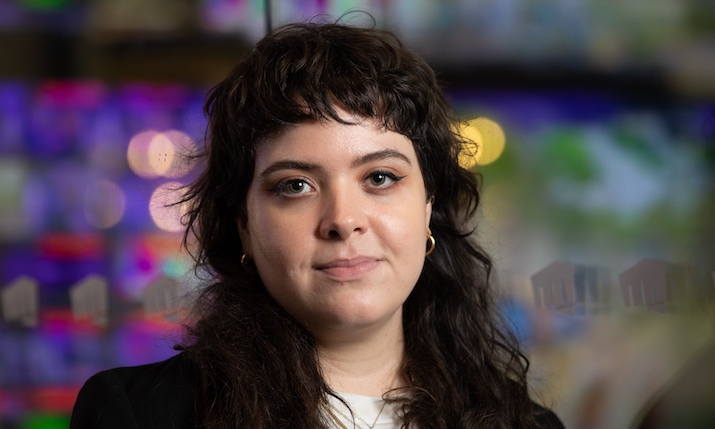Digital democracy: Riot Games’ Ericka Duffy praises esports equality

Duffy: ‘In esports broadcasting there is rarely an attitude of ownership of expertise’
“Sports broadcasting can definitely present challenges as a woman,” says Ericka Duffy, media assets manager for Riot Games. “However, with esports being a new element, it has democratised access.
“There’s a parity of access into gaming that isn’t traditionally there for sports, which means in esports broadcasting there is rarely an attitude of ownership of expertise,” she adds. “It really feels like an open, level playing field, if you can excuse the pun.”
Specialising in media asset management (MAM), content tagging and curation, Duffy saw a fresh attitude towards MAM in broadcasting, and in esports broadcasting in particular.
“Non-traditional broadcasting requires non-traditional workflows and a huge reliance on remote content storage and organisation,” she says. “Content powers the broadcast after all, whether it’s player interviews or insert slates for the live broadcast. It’s rare to get such focus and emphasis on MAM, so it was a huge draw for me to work in an organisation that prioritises innovation in the space.”
Riot was her first direct brush with working in TV. “The core fundamentals of MAM are the same for digital spaces as for broadcasting, but the delivery mechanisms can vary massively,” she notes. “Learning broadcasting technology was a steep learning curve but being surrounded by SMEs across the board has helped; broadcasting is full of solutions-orientated people happy to share their expertise when you flag a problem you don’t have a fix for; this hugely speeds up learning.”
Game on
Having studied digital media in college, Duffy applied for an advertised media asset manager position when Riot Games opened its Remote Broadcast Centre in Dublin. “Looking at the role I didn’t quite know what I was getting myself into but I’m so glad I applied!” she says. “The scale of the role and the level of autonomy offered by Riot to invent innovative processes to aid their esports productions was a huge draw.”
Getting to grips with broadcast technology was an early challenge. “As I come from a digital background, it was like learning to drive a beat-up automatic car and then being given a Ferrari to use,” Duffy says. “Key to absorbing the workflows and technology was not being afraid to ask questions. Riot is full of mentors and teachers who are happy to help, even though approaching them can initially seem intimidating. However [with Riot] there’s no idea too big or too hard, I found it super-exciting to work for a company that would double down on any pivot.
“This role represents a huge step up for me in terms of possibilities,” she continues. “Riot has a really unique perspective on content, asset management and storage. Not many places have the same attitude, but Riot has seen early on that it’s key to powering the sport for fans. It’s really an honour to grow in this role and I feel the support and encouragement every day.”
Striking company
Camaraderie is a huge element in Duffy’s satisfaction with the job. “A broadcast is almost like a mini democracy, with so many departments working together to create a functioning show. We all rely on each other massively for technical, and sometimes emotional support,” she says, but she also enjoys the excitement: “Striving to adapt to live conditions and anticipate all the requirements colleagues have is a bit like playing chess every day but you have some pretty cool technology to back it up.”
Another exciting facet is Riot’s Remote Broadcast Centre – Project Stryker – in Dublin. “Seeing Riot make a bold bet on the future of sports broadcasting by taking things remote, and following through with it, has been incredibly inspiring to see. They’ve created a pretty special team to power it and I’m humbled to be one small part of it,” she says. “The coolest thing I’ve worked on so far is being a part of the remote broadcast production of Game Changers 2022. It’s a Valorant league designed to uplift and empower women in the sport. Seeing the passion and craft that went into it, as well as the players excelling and getting a spotlight in a male-dominated – so far! – sport was awe-inspiring.”
“Striving to adapt to live conditions and anticipate all the requirements colleagues have is a bit like playing chess every day, but you have some pretty cool technology to back it up”
As esports is such a global offering, the range of time zones can pose a challenge though. “Working remotely means that I’m there to support the broadcast if it’s in Berlin or Singapore, which means adapting my schedule to suit that. But it also means I get to see some pretty cool sunrises and sunsets!”
Inspiring confidence
She has advice for other women looking to move into a similar role: “Don’t be afraid to take up space. This means having the confidence to ask questions when you don’t know, and also provide the answers when you do know. It can be pretty intimidating sometimes, but with esports in particular, there’s a huge parity of esteem for men and women and that makes it a refreshing ecosystem to be a part of.”
She’s also got some general advice for dealing with those challenging last-minute turnarounds: “In a live broadcast, there’s always a random ask thrown in at the last minute which is sort of the antithesis of what MAM is all about. However, if you’re strong enough in your craft, you should be able to pivot and help the ask. Always keeps things spicy, right up until the cameras stop rolling!”

